The importance of routine maintenance cannot be understated. It not only helps to keep your car running as it should but also saves you a lot of money in the long run.
This includes oil changes, air filter replacements, rotating the tires, and so on. But among the key components that you need to keep an eye on are the spark plugs.
To do that, you need to know exactly how long spark plugs last, and what the correct spark plug replacement interval is.
That’s what we’ll discuss in this guide, so you can stay on top of your car’s maintenance schedule and keep it running like new.
What Are Spark Plugs? How Long Do They Last?
A spark plug is a small device that plugs into the engine cylinder and provides the spark for combustion. Most engines will have as many spark plugs as there are cylinders.
When spark plugs collect carbon deposits or corrode, they become less effective over time, and they’ll eventually die if you neglect them for long enough.
Ideally, you should change your spark plugs every 100,000 miles. However, this depends on several factors that we will discuss in this article.
What Happens if You Don’t Replace Them Regularly?
Bad spark plugs aren’t always easy to spot. Most of the time you won’t realize there’s a problem right away.
But eventually, they will fail, and you’ll notice this when your engine starts misfiring. If this is ignored, it can lead to more damage.
An even more serious concern comes about when you have a seized spark plug. The longer it stays in your vehicle the more likely it is to seize.

When this happens it makes it far more challenging to remove the spark plug. In the worst-case scenario, the spark plug will crack.
Your mechanic will have a few different options to remove the spark plug at that point, but the worst-case scenario is that they’ll need to drill it out.
This will involve tearing apart your entire engine to clean out the combustion chamber. And if that has to be done because you didn’t change the spark plugs on time, there’s a good chance the mechanic will pass on the expense to you.
All this to say, replace your spark plugs at the correct service intervals to prevent problems from snowballing and costing you a ton of money!
Spark Plug Lifespan Based on Electrode Material
How long your spark plugs will last comes down to how many miles you’re clocking, as well as the replacement intervals and the type of spark plug you’re using.
We’ll break it down for you by each spark plug type, that way you know when you should start pulling and replacing the spark plugs in your vehicle.
Copper
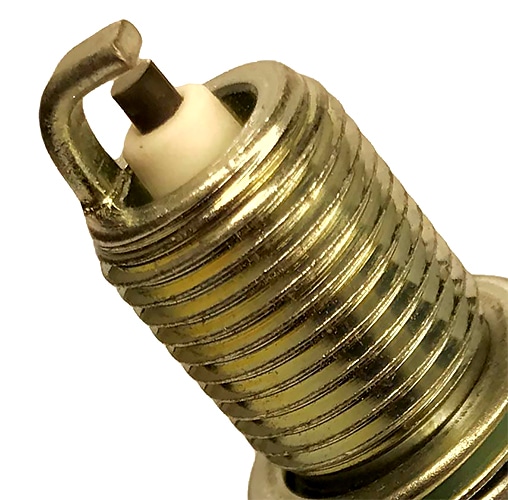
Considering the average spark plug replacement costs, copper core plugs are the cheapest option, and that’s the reason why they’re the most common type.
They’re cheap, sure, but even though you’re saving a little money upfront, when you compare the cost per mile to higher-end options you’ll end up spending more because of their frequent replacement interval.
But because copper is a softer metal that has a lower melting point, these plugs don’t last very long.
You should change out copper spark plugs between 10,000 and 20,000 miles, which is a much shorter interval than what other spark plugs offer.
That’s why we don’t necessarily recommend these unless you have a supercharger or turbo installed.
Platinum
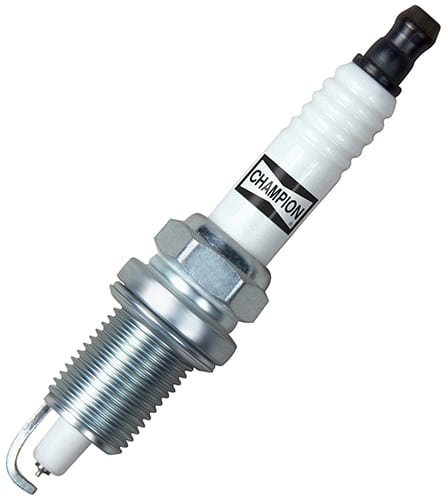
One step up from copper spark plugs are platinum spark plugs. They typically cost about two to three times as much as copper spark plugs, but they more than make up for it with their longer durability.
Platinum spark plugs typically last about 60,000 miles, which is three to six times more than what you can expect from copper spark plugs!
Double Platinum
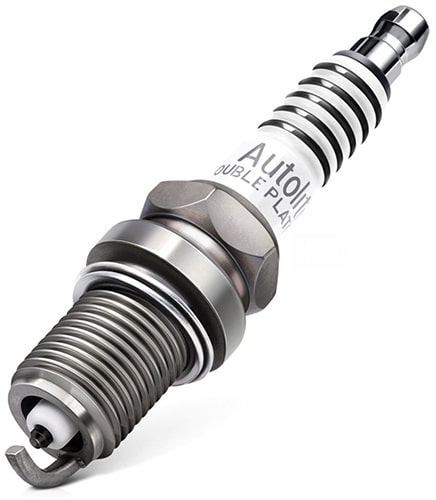
Double platinum spark plugs are just like regular platinum spark plugs, except that they last much longer. That’s because they have a platinum disc on both the center and side electrodes.
If you like the platinum spark plug design and want more longevity, these are the ones to go for. They cost a little more than regular platinum spark plugs, but they typically last about 100,000 miles.
Iridium
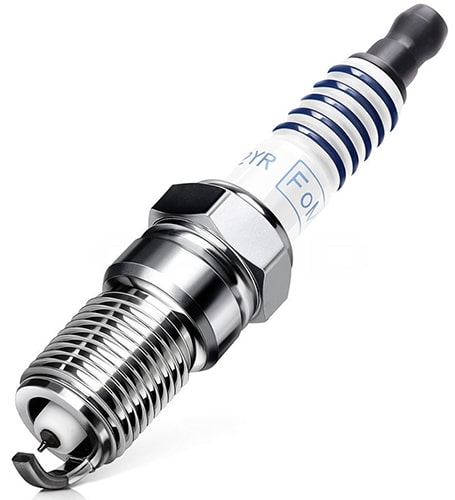
Even though iridium spark plugs are the most expensive option on our list, we definitely recommend them. They’re a bit more expensive than platinum spark plugs, but you can expect to get a lot more life out of them.
The average iridium spark plug will last between 60,000 and 100,000 miles depending on your car and the way you drive it.
Double Iridium
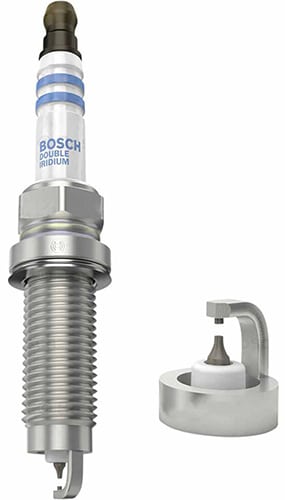
Just like double platinum spark plugs extend the lifespan of regular platinum spark plugs, double iridium spark plugs last a bit longer than regular iridium spark plugs.
They cost a bit more, but because they last between 100,000 and 150,000 miles. They really have a low cost per mile.
Ruthenium

Ruthenium spark plugs aren’t quite as common as copper, platinum, or iridium, but if you find a set of ruthenium spark plugs for your vehicle, they’re an outstanding choice.
That’s because they’re incredibly durable, last for a really long time, and have a lifespan of over 100,000 miles. Some ruthenium spark plug manufacturers claim that their spark plugs can last up to 200,000 miles!
We recommend changing them a little more frequently than that though, but there’s no doubt that ruthenium spark plugs can last quite some time.
Conditions That Deteriorate Spark Plug Lifespan
You’re probably well aware of the symptoms of bad spark plugs, but do you know what conditions actually lead to them deteriorating in the first place? Here are some examples for your reference:
- Fuel purity: Poor quality fuel contains contaminants that will clog up your fuel filter prematurely and enter your engine cylinder. This will cause your spark plug insulators to erode which can create electrical shorts, leading to pre-ignition and detonation.
- Using leaded fuel: Leaded gasoline introduces lead into the combustion chamber which then settles onto sensitive components. This build-up will eventually start affecting the spark plugs.
- Ignition timing: When ignition timing is over-advanced or retarded too far, it will take a toll on the spark plug.
- Improperly torqued plugs: If your spark plugs are fitted too loose or too tight, they will either crack the insulation or cause the electrodes to melt due to overheating.
- Faulty head gaskets and internal oil leaks: When motor oil or coolant leaks into the combustion chamber for whatever reason, it forms a varnish on the spark plug electrode, causing it to malfunction.
- Overheating: Pre-ignition or a malfunctioning cooling system will overwork and overheat the spark plugs, causing them to fail prematurely.
- Wrong heat range: Using spark plugs that are either too hot or too cold for your engine will result in a range of issues such as fouling, misfires, stalling, poor fuel economy, and prematurely worn-out electrodes.
That’s not all. There are some factors that impact the discharge voltage of your ignition coils and mess with your spark plugs as a result. These include:
- Incorrect gapping: The higher your spark plug gap, the higher the discharge voltage. As the gap widens through wear and tear, it necessitates a higher discharge voltage, causing misfires to occur more frequently.
- Air-fuel mixture temperature: As the air-fuel mixture temperature rises, the discharge voltage drops. This means lower engine temperatures require higher voltage, making misfires a common occurrence at low temps.
- Air-fuel ratio: The leaner the air-fuel ratio, the higher the discharge voltage.
- Electrode temperature: The temperature of your spark plug’s electrode is directly proportional to engine speed. Discharge voltage drops as the electrode temperature rises, making misfires occur at low speeds.
- Compression pressure: Discharge voltage rises in proportion to compression pressure, which means sudden acceleration, especially at low temperatures, will demand higher voltage and create an environment conducive to engine misfires.
Tips for Changing Your Spark Plugs
There’s nothing wrong with getting your spark plugs changed by a mechanic. But if you want to save yourself some money, you can do it yourself. It’s pretty straightforward.
It all starts with using the right tools. You can’t use a regular socket wrench as it won’t reach the bottom where it needs to latch onto the plug, so consider purchasing a quality set of spark plug sockets.
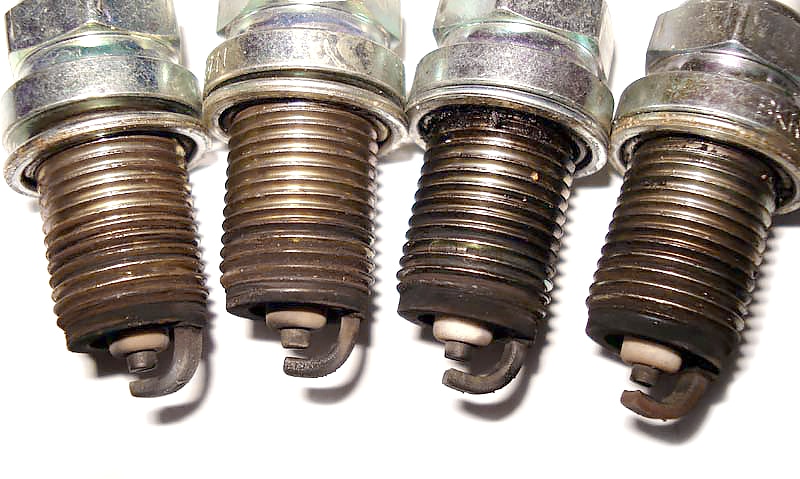
Not only will using these sockets make the job a lot easier, but it also reduces the risk of snapping any spark plugs while you’re taking them off.
Another thing to be mindful of is to replace the plugs one at a time. It is tempting to unplug them all at once, but it’s a lot easier to keep track of everything and hook up the wires correctly if you install the new plugs one at a time.
Finally, the last thing you want to do is swap out all the spark plugs only to realize that the gap is wrong. It’s a rare occurrence with new spark plugs, but it does happen.
Because of this we highly recommend purchasing a spark plug gapper. However, it is possible to gap your spark plugs without a tool.
It only takes a few seconds to check each spark plug when you have the gapper, and it can save you a ton of frustration later if you happen to get a spark plug that had its gap knocked out of place.
Choosing the Right Spark Plugs
There’s no “right” type of spark plug for any vehicle, but there are spark plugs that will save you some work and money.
That’s why we highly recommend going with platinum, iridium, or ruthenium spark plugs. They cost a little more upfront, but they last far longer than their copper counterparts.
From there, platinum is a little less durable than both iridium and ruthenium. And while ruthenium lasts the longest, if you’re driving a high-performance vehicle, iridium can handle a little more heat.
Once again there’s no “wrong” choice here, but that’s how you’ll get the most out of your spark plugs!
The Last Spark
Car maintenance is expensive, and to many, it might seem like an unwanted expense. But you’re really saving yourself money in the end by preventing future problems from cropping up.
Do you have a favorite type of spark plug for your vehicle or a question about which spark plugs you should use? We’d love to hear from you!

